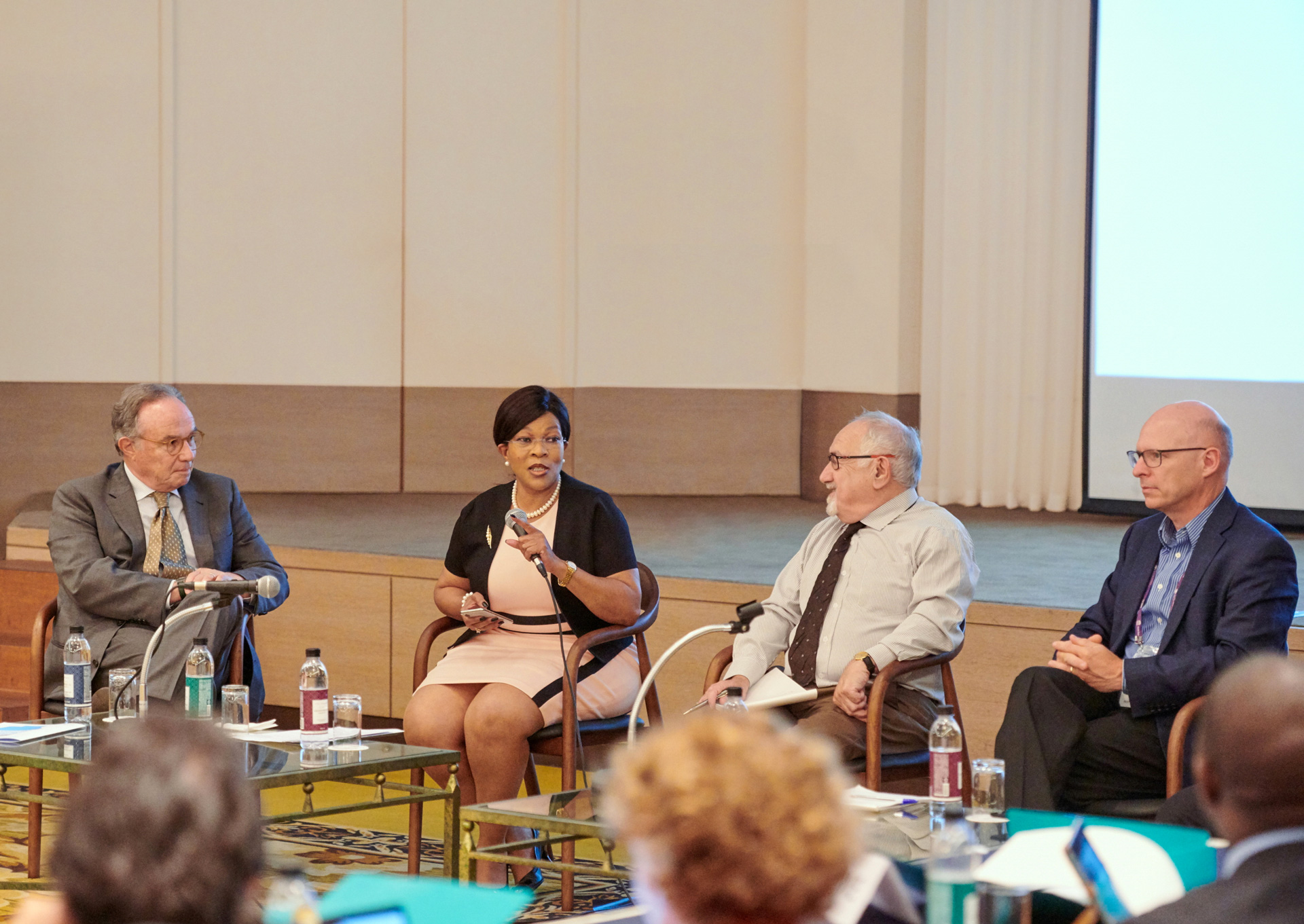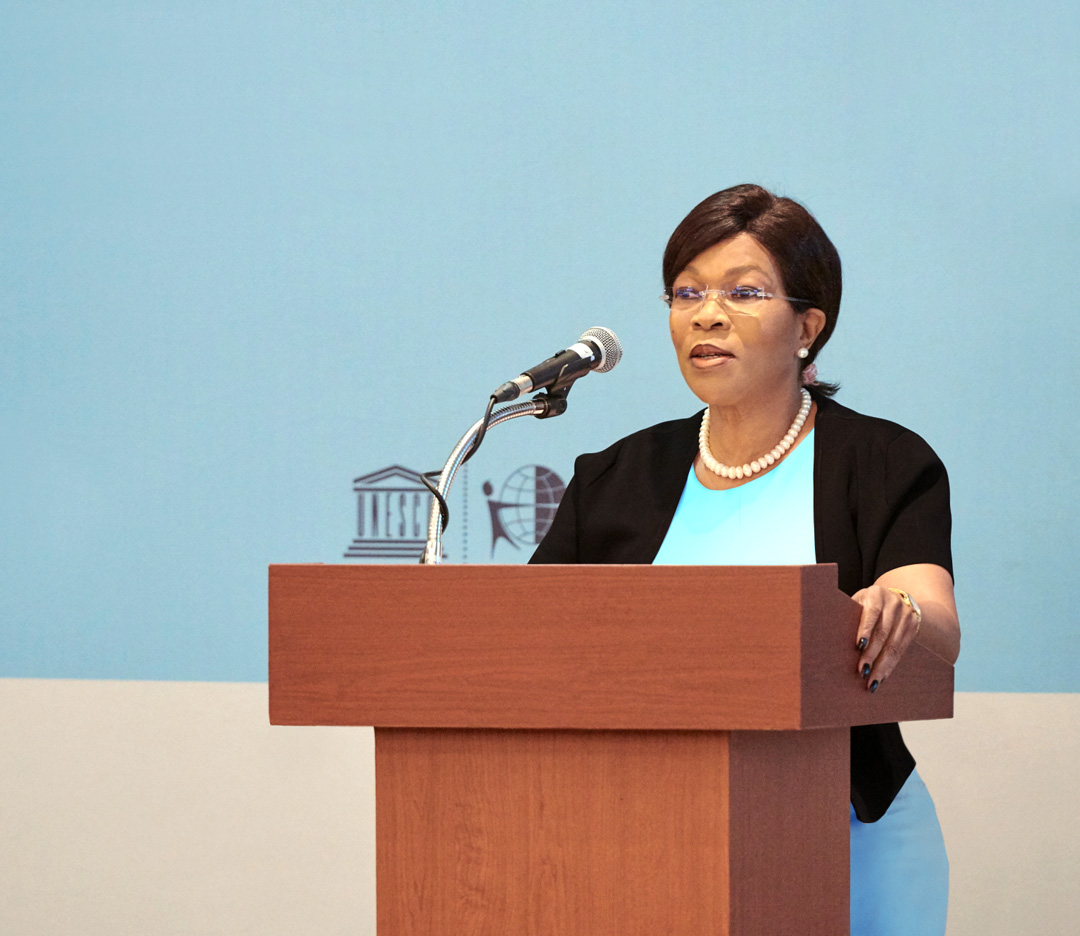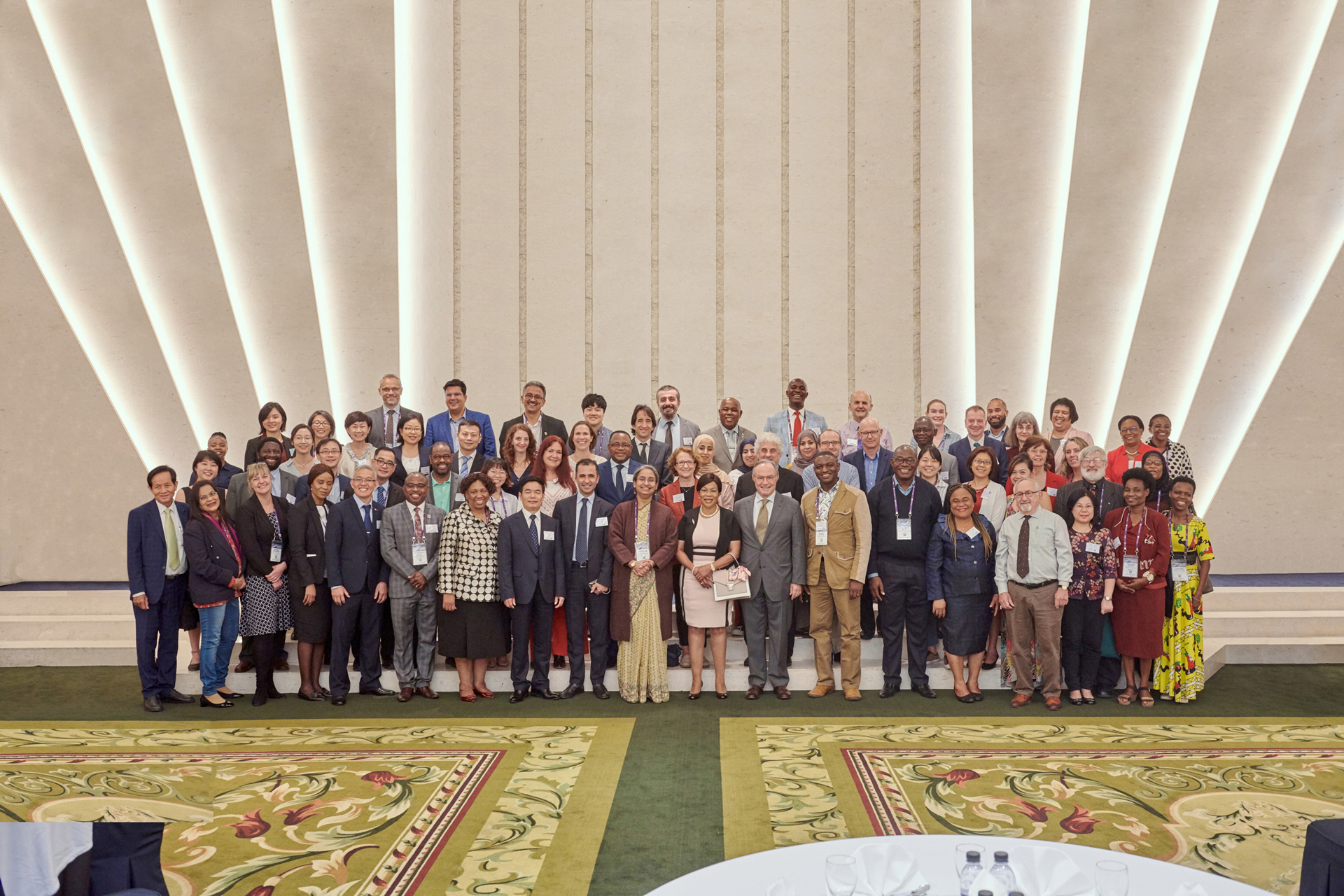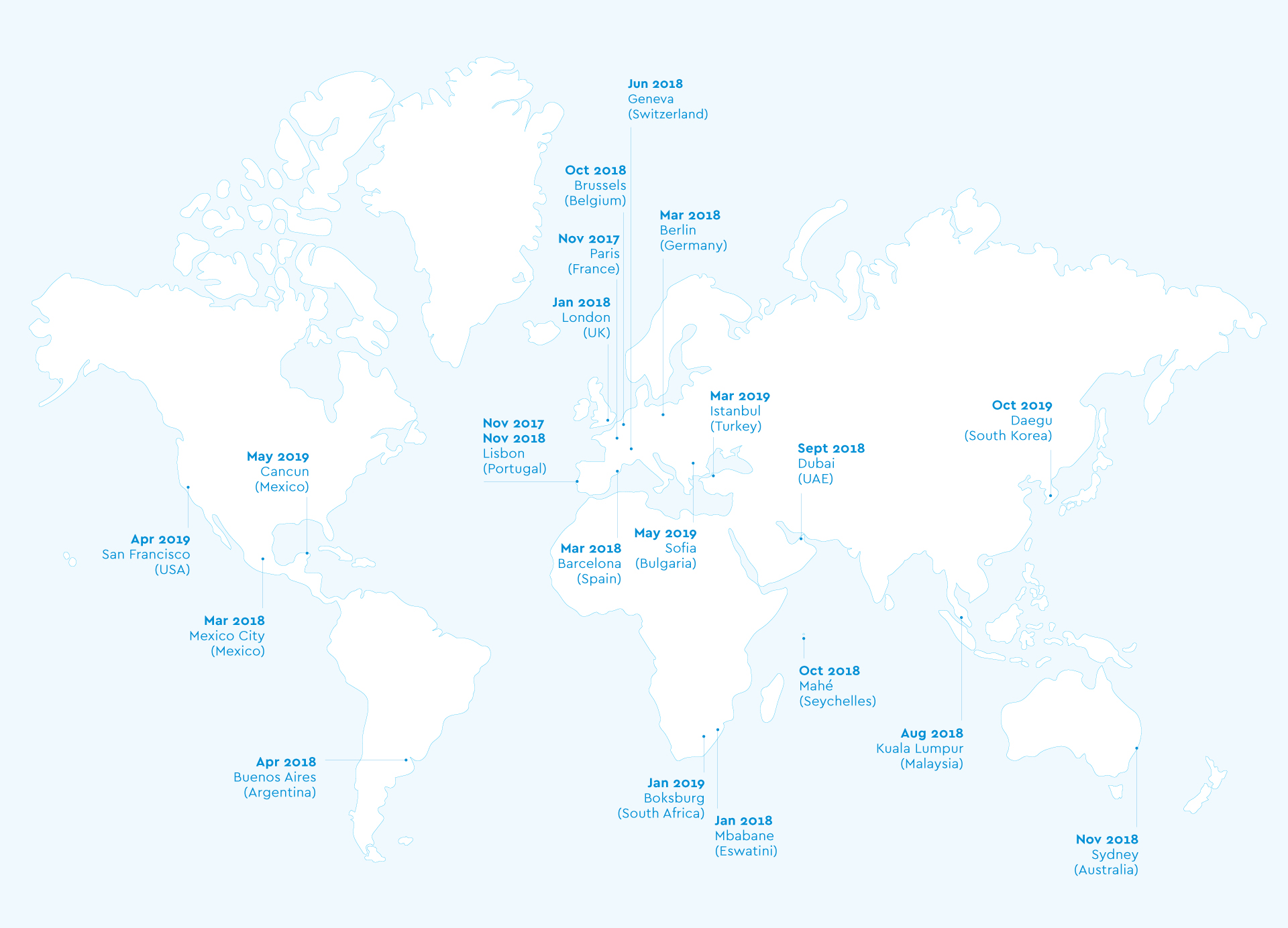
Learning
Looking back to move forward
from ideas and norms to implementable curricula
February 10, 2021
Like the mystical Sankofa of Asante Adinkra symbology, the IBE looked back on 2017 in order to move forward in 2018/2019.
By Dr. Mmantsetsa Marope
10/02/ 2021
·
- Share
2017 was the year to consoliodate the IBE’s global intellectual leadership and its norms- and standard-setting functions in curriculum, teaching, learning, and assessment. Through a consultative process, the IBE prepared normative documents to serve as global reference points for countries seeking to develop curricula that can prepare learners for the future of work and life in fast-changing contexts. These documents encompassed the following: a future paradigm shift on curriculum; the transformation of teaching, learning, and assessment required to best support future curricula; a global future competence framework; a study of what constitutes a quality curriculum; and a prototype national curriculum framework. In order to clean up and streamline the language of intellectual and conceptual dialogue on curriculum, the IBE also expanded and updated its Glossary of Curriculum Terms in line with its futuristic thinking on the field. Collectively, these intellectual and normative products form part of the IBE’s growing compendium meant to guide the future of K-12 curriculum.
By the end of 2017, the IBE shared its normative work on the future of curriculum with ministers of education and their senior experts during a side event of the 39th session of the UNESCO General Conference. Ministers applauded the work, calling strongly on the IBE to ensure its wide dissemination and to provide concrete examples of its implementation in real contexts of their curricular reforms. This ministerial call set the stage for most of 2018/2019.

Disseminating normative and other intellectual products
By the middle of 2019, these five normative documents on the future of curriculum had cumulatively been downloaded 4,815 times from the IBE website. On demand from Member States and their institutions, they were presented in prestigious forums across 20 cities, multiple times and to different audiences.
The IBE Glossary of Curriculum Terms enjoys wide recognition and usage, as evidenced in its extensive citation in the OECD Curriculum Glossary and its adoption by UNICEF for use in the Arab States, including its translation into Arabic.
Translating norms into future-relevant curricula
Adopting a norm does not guarantee capacity for its implementation. Consequently, translating norms into impactful curricula is often a long and less travelled road. Not surprisingly, in 2017 ministers of education asked the IBE to provide concrete examples of the application of its normative work in real contexts of curricular reforms. Seven countries and 26 institutions benefitted from the IBE’s technical support in translating normative work into implementable programs. Afghanistan, Eswatini, Kenya, Myanmar, and Seychelles received technical support to align their national K-12 curricula with the IBE’s paradigm and future competence framework. South Africa engaged the IBE in technical dialogue, on the basis of which it adopted its global future competence framework and proceeded to use its own technical capacity to apply the framework in improving its K-12 curriculum. Kuwait engaged the IBE’s services to undertake a technical audit of its K-12 competence-based curriculum to ensure its alignment with the IBE’s futures perspective on curriculum and with global best practices. The International School of Geneva (ECOLINT) in Switzerland and a chain of 25 Mektebim schools in Turkey also adopted the IBE’s global future competence framework. For ECOLINT, the IBE framework guided the whole curriculum with a view to transform the school into an IBE Flagship School. For Mektebim schools, support was provided to transform their STEM curriculum into a competence-based STEM Best Practice Futures Curriculum.
Strengthening technical capacity to implement norms and standards
Sustained compliance with global norms and standards requires technical leadership capacity at a national level. During 2018/2019, the IBE sustained capacity development through the skills transfer embedded in technical assistance, direct training, provision of resource materials, peer learning, and dissemination of promising practices and innovations. Cambodia, Mongolia, Colombia, and Uganda received technical support for the implementation of global citizenship education (GCED) policies and programs through their curricula. An IBE conceptual framework was applied to analyze secondary-level youth education in Argentina, Brazil, Chile, Mexico, and Peru. In addition, 18 countries gained a deeper understanding of the framework through a consultative forum for its validation.
A range of IBE resource materials buttressed technical and operational capacities of curriculum practitioners across Member States, including a Guide for Developing and Implementing Teacher Education Curriculum Frameworks, aligned with the IBE future-competence framework. Its dissemination was enhanced through translation into Arabic, French, and Spanish. The Resource Pack for Gender-Responsive STEM Education was translated into French, raising the possibility of its application across Francophone countries. In collaboration with the Organization of Ibero-American States, the Guide for Enhancing Inclusion and Equity in Education was made available online in English, Portuguese, and Spanish with a view to benefitting 22 partner countries. The English version of the IBE GCED Resource Pack was placed online, to support Member States’ mainstreaming of GCED in their curricula. The Curriculum Resource Pack was updated and—already in English and Spanish—translated into Arabic and French. Reaching Out to All Learners: A Resources Pack for Supporting Inclusive Education was also translated into Arabic and made available online.
IBE-accredited certificate, postgraduate, and master’s programs run with partner universities continued to raise the threshold of technical leadership for curricula at the country level. The regional Master’s in Curriculum and Learning course for the Arab region was developed and is now being implemented. Existing master’s courses for Africa and for Latin America and the Caribbean were upgraded to take into account recent IBE knowledge outputs. The IBE ran a course on leading curriculum reforms, tailored for senior curriculum experts in Malaysia. It ran another tailored course—on effective implementation of competence-based STEM curricula—for around 100 teachers in Mektebim schools in Turkey. Combined, these courses have now benefitted participants from 80 countries.
The technical and operational capacities of Member States were further strengthened through peer learning and exchange of best practices. For early childhood education and development (ECCD), in particular, the IBE co-convenes (with Seychelles) a biennial international conference that brings together countries at different levels of advancement in the field. In February 2019, participants from 23 countries met in Seychelles for this purpose. This biennial platform also promotes south-south, north-south, and south-north collaboration across Member States. So far, collaboration has focused both on addressing institutional fragmentation—which undermines the delivery of holistic ECCD services to children under 8 years of age—and on building reliable data systems to monitor holistic early childhood development and to push forward with SDG 4.2. Earlier in 2018, high-level experts from all over the world met in the United Arab Emirates to share their experiences of building resilient ECCD systems and in monitoring holistic early childhood development.
The IBE continued to bolster peer learning by disseminating information about promising practices and innovations from Member States through its bi-weekly Alerts and Digests. In 2018/2019, it disseminated online a total of 40 Alerts and 7 Digests. Alerts subscribers increased by 72%, from 794 in 2017 to 1,371 by mid-2019. The IBE also launched a quarterly newsletter that mainly targets members of the IBE-UNESCO Global Curriculum Network (GCN) and provides a platform for sharing promising and innovative practices from their respective countries. During 2018/2019, the GCN supported active members from 138 countries, expanding to faculties of education with robust curriculum programs across 142 universities in 39 countries.

IBE Director 2014 – 2020, Mmantsetsa Marope, in dialogue with Pierre Magistretti, Brian Butterworth, and Stanislas Dehaene. High-level Forum on Neuroscience and the Future of Education and Learning, Daegu, 23 September 2019.
Translating neuroscience research to inform teaching and learning processes
Careful development of quality and future-relevant curriculum is an indispensable starting point for preparing learners for the future of work and life. However, without effective teaching, impressive curricula represent ineffectual documents and unrealized potential. The persisting global learning crisis suggests that effective teaching still eludes an uncomfortably large number of education systems, including those with impressive curriculum documents. As 2030, the target date for the Sustaibale Development Goals, draws closer, it is a pressing imperative that the global education community renew efforts to improve effectiveness at facilitating learning. At least in part, this calls for the strengthening of teachers’ scientific understanding of the learning brain.
Proceeding from a premise that a better understanding of human learning should enrich teachers’ insights on effective teaching, the IBE redoubled its efforts to translate findings from credible neuroscience research to informing teaching and learning. This translation work is in the form of short and accessible technical briefs that make evident the implications of research findings for teaching and learning. During 2018/2019, the IBE added a new set of 36 briefs to the 30 already completed in 2017.
The IBE’s capacity to expand this work should grow quickly, thanks to its technical partnerships with prestigious research centers on the sciences of learning at the universities of Member States. By mid-2019, the IBE had established such partnerships with the Institute for Learning & Brain Sciences, University of Washington; the Queensland Brain Institute, University of Queensland; Technology-enhanced Learning in Science, University of California, Berkeley; Western University, Canada; and Université de Paris Descartes. More partnerships are soon to be signed with Beijing Normal University; the Cuban Neuroscience Center; Universidad de la República, Uruguay; and University of Cambridge.
The IBE developed its Science of Learning Portal during 2018/2019 to expand access to technical briefs to teachers (first and foremost), other education practitioners, researchers, and policymakers. The IBE also began integrating neuroscience into its current training programs for curriculum specialists. In addition, it began developing curricula modules on neuroscience for Member States to include in their teacher pre- and in-service training programs. As the IBE develops course materials, Seychelles has volunteered to pilot them and to improve their impact, while gaining a head start.
To anchor this work in national policies and practices, the IBE co-convened with the International Brain Research Organization (IBRO) a ministerial dialogue on neuroscience and the future of education and learning during the 10th World Congress on Neuroscience, in September 2019. The dialogue specifically targeted ministers from Africa, Arab states, South Asia, and West Asia, where neuroscience is yet to be mainstreamed into pre- and in-service programs for educators—especially, though not exclusively, teachers.

IBE Director 2014 – 2020 delivers opening remarks, High-level Forum on Neuroscience and the Future of Education and Learning, Daegu, 23 September 2019.
Building capacity for effective learning from the base
Effective teaching is essential for facilitating learning. However, it needs to be underscored that, ultimately, it is the learners who do the learning, not the teachers. The latter can only facilitate the former. The most effective teaching in the world will not realize commensurate learning outcomes if it is not complemented by an effective capacity to learn. For many children, a range of factors—including malnutrition, diseases, fatigue, toxic stress, non-conducive home environment—undermine their capacity to learn. Yet, effective learning is just as important to effective curriculum implementation as effective teaching, if not more so. Thus, while it is important to support teachers in effective teaching, it is even more important to support learners in effective learning.
Compelling research evidence speaks to the indispensable role of quality and holistic ECCD services in building capacity for effective lifelong learning. Yet, to date, a little under half of the world’s children do not have access to such programs. Where programs exist, their quality and effectiveness remain unclear, especially for ages 0-3, the most critical age for building effective learning capacity. More often than not, delivery of ECCD services to children aged 0-8 years old is undermined by institutional fragmentation and by poor capacity to monitor holistic early childhood development.
During 2018/2019, the IBE deepened its effort to build capacity for effective learning from the base. It advanced work toward articulation of an ECCD System Prototype. Furthermore, it provided Cameroon, Eswatini, Seychelles, Laos, and Rwanda with technical support to apply the evolving prototype toward strengthening their national ECCD systems. The same countries also piloted the evolving Holistic Early Childhood Development Index (HECDI) to improve the monitoring of their systems’ impact on holistic early childhood development.
Reinforcing the monitoring of SDG 4.1
Assessment collect evidence of effective learning through the proxy of learning outcomes. Curriculum guides teaching, learning, and assessment. Logically, intellectual and technical leadership for monitoring learning outcomes is within the core competences and mandate of the IBE. During 2018/2019, the IBE completed an analysis of the National Assessment Frameworks (NAFs) of 73 countries for reading and of 115 countries for mathematics in order to ensure the development of credible Global Assessment Frameworks (GAFs) for SDG 4.1 (reading and mathematics). Following extensive consultations, these frameworks were adopted for use in monitoring SDG 4.1.
Stimulating reflective dialogue on areas of IBE competence
The IBE’s In Progress Reflections (IPRs) continued to stimulate reflective dialogue on critical and emerging issues on curriculum, teaching, learning, and assessment. Fifteen IPRs were developed and disseminated during 2018/2019.

Group photo, High-level Forum on Neuroscience and the Future of Education and Learning, Daegu, 2019.
Strengthening internal intellectual and operational capacity
The effectiveness of the IBE at executing its mandate rests on its own internal capacity and on opportunities for its constant renewal through staff learning. Staff efforts are augmented through the IBE Learning Series, which is also open to International Geneva, especially education professionals. During 2018–2019, the IBE staff participated in 5 IBE sessions, titled: The Future of Africa: AI, Robotics, and Education; Educating for the 21st Century: 7 Global Challenges; Neuroscience and Education: Addressing the Global Learning Crisis; Migration, Displacement and Education: Building Bridges, Not Walls; and Immigrants and Comparative Education: Call to Re/Engagement.
2018/2019 also witnessed an impressive growth in the base of IBE Senior Fellows, who, by all measures, are an integral part of the institutional brain trust. The IBE Senior Fellows have immense expertise and enviable experience in the following fields: competence-based curriculum, futures curriculum, neuroscience of education and learning, cognitive psychology, reading and writing in the early grades, teaching, teacher education and continuous professional development, ECCD, assessment for learning, STEM education and learning, technology education, AI and education, and robotics and AI in the early grades.
An exceptional base of consultants augmented the expertise and experiential base of IBE Senior Fellows. Combined, senior fellows and consultants are what give the IBE the agility for constant self-renewal and flexible constitution of teams whose skill mix measures up to the task.

